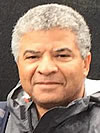
Rufus Catchings
U.S. Geological Survey
2018 Bromery Award for Minorities
Presented to Rufus Catchings
Citation by Lisa White
I am delighted GSA is honoring Rufus Catchings with the 2018 Bromery Award. An internationally renowned geophysicist at the USGS, Rufus’ field investigations and seismic monitoring projects along the San Andreas and other active fault zones is critical to understanding crustal structures, fault dynamics, and earthquake hazards. Rufus’ leadership on the deployment of seismograph arrays in selected field areas is useful not only for the identification of fault zones but also for mapping internal physical properties of seismic waves in shallow crust. His research is high-impact with many practical and applied applications in water resource exploration and environmental remediation. Rufus is an exceptional person who has developed a strong scientific record with a large impact and he is frequently tapped by the media for interviews about the importance of actively monitoring fault movements. A natural teacher, Rufus’ willingness to mentor students has lasting impacts in increasing access and inclusion to geophysics careers.
2018 Bromery Award for Minorities — Response by Rufus Catchings
I am honored to receive the GSA’s 2018 Bromery Award. I thank Dr. Lisa White for nominating me, those who provided letters of support, GSA, and I especially thank the late Dr. and Mrs. Bromery for their foresight and generosity in developing this award for those of us who follow in their footsteps. I feel a kindred spirit with Dr. Bromery, a one-time USGS African-American geophysicist who undoubtedly experienced many wonderful scientific discoveries, while also experiencing disappointments inherent in being one of the few minority scientists in the field.
I have worked as a geoscientist for many years, and there have been many individuals who have assisted me along the way, most of all my supportive parents, siblings, and wife. The list of supportive scientists would be too long to thank them all by name, but I especially would like mention a few of them who have been particularly instrumental in my journey: Dr. Fred Webb (Appalachian State Univ.), who introduced me to geology; the late Dr. K.O. Emery (Woods Hole Oceanographic Institute), who guided me through some of my earliest research; Dr. Peter Molnar (MIT), who served as a mentor in my earliest days of graduate school; the late Drs. Clarence Clay and Bob Meyer (Univ. Wisconsin), who helped me to focus my research efforts; the late Dr. George Thompson (Stanford University), who advised me through the Ph.D. program and beyond; the late Lou Pakiser (USGS), who insisted I take the research path; Waverly Person, my first USGS supervisor and an African-American role model, and Dr. Walter Mooney (USGS), an early advisor and current research colleague.
The Bromery award cites research in the geosciences and opening geosciences to other minorities. Based on my experiences and my interactions with students and colleagues from many nations, I think it is the research that will be the catalyst to bringing scientists (minority and non-minority) into the field. In my career, I have been fortunate to conduct geophysical research nationally and internationally in a number of focus areas, including the Earth’s crust and upper mantle, natural resources, natural hazards, and even the effects of meteor impacts on the Earth (the thrill of discovery never goes away).
There have been two great attractions that have led me to and kept me in the geosciences. One of the great attractions has been the opportunity to help others, whether mitigating hazards, finding needed resources, or just providing knowledge of how the Earth’s machinery works. Another great attraction has been that the entire Earth is a laboratory, which means that research efforts and collaborations are not limited by geographical boundaries or to specific groups of people. Regardless of nationality, gender, or ethnic background, geoscientists will be increasingly needed as we enter into a challenging period for human habitation on our small planet and as we reach beyond the planet. The Bromery award recognizes that need and encourages the goal of obtaining scientific contributions from a diverse perspective.
